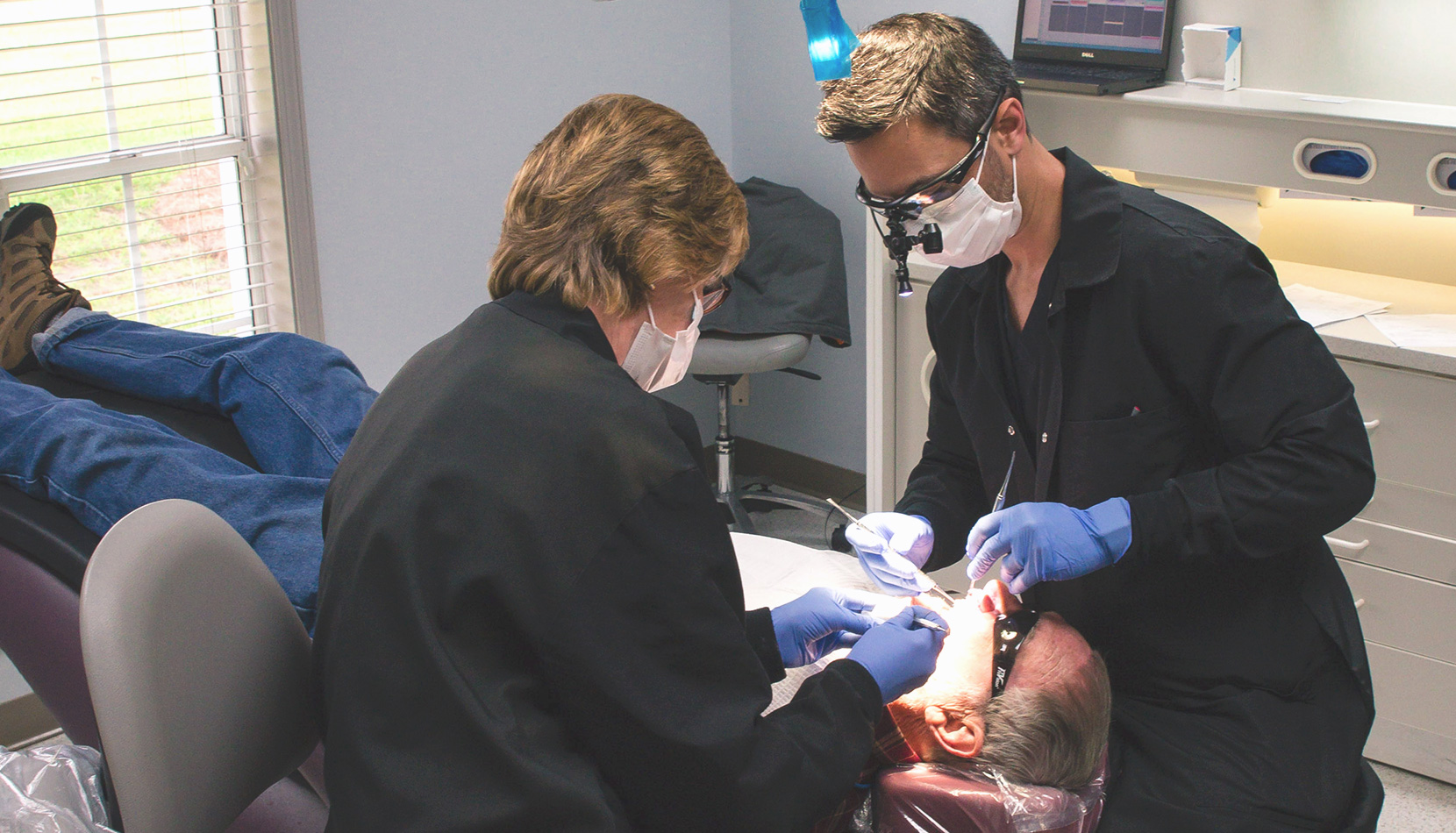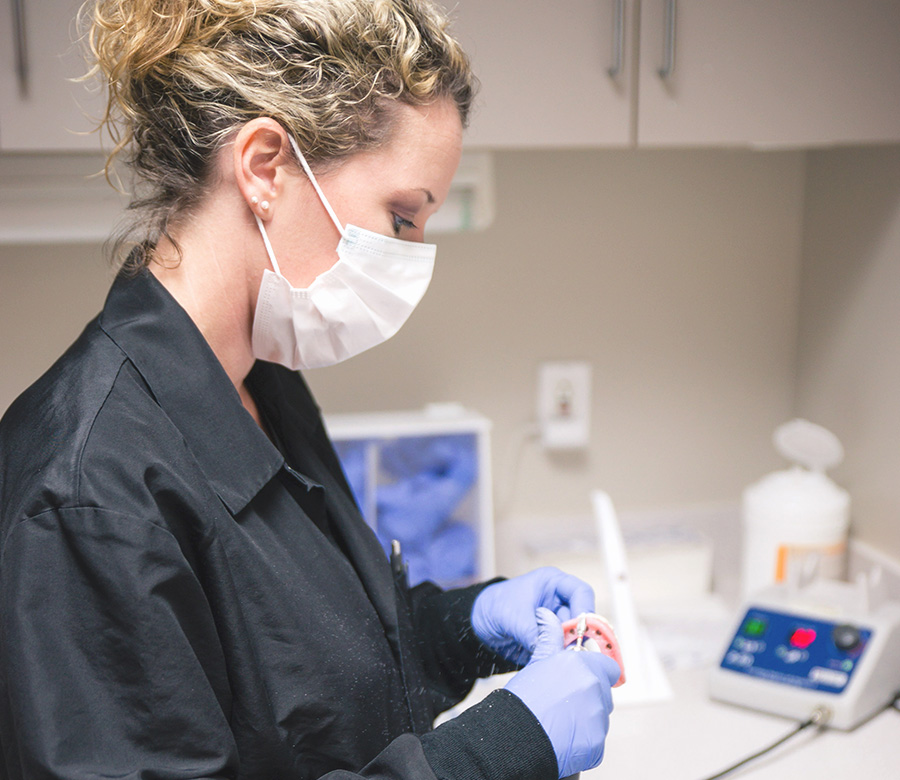Whether your dental needs are a complete exam and cleaning, a full-mouth surgical procedure, or anything in between, we promise to provide you with exceptional care as we enhance the natural beauty of your smile. Below are just some of the many procedures and services we regularly provide to our patients – with a gentle touch and stunning results. Your smile is our first priority, and we’ll give you something to smile about.
Our Services
Our Skilled Staff Has
a Gentle Touch.
If you have any questions, concerns, or would like to schedule an appointment, please contact us today. We look forward to providing you with the personal care you deserve.


Periodontics
A periodontist is a dentist specializing in the prevention, diagnosis and treatment of infections and diseases in the soft tissues surrounding the teeth and the jawbone to which the teeth are anchored. The most common conditions treated by a periodontist are:
- Gingivitis – mild inflammation of the gums
- Mild/moderate periodontitis – a bacterial infection of the gums, also known as gum disease
- Advanced periodontitis – bone loss, shifting or loosening teeth due to untreated gum disease
- Missing teeth – tooth loss due to untreated gum disease
Periodontists perform a wide range of procedures, most of which are used to treat periodontal disease, including scaling and planing, tissue regeneration, dental implants, and sinus augmentation.
Periodontal Disease
Periodontal Disease, also called periodontitis or gum disease, is a common bacterial infection of the gum tissue. If left untreated, it can lead to shifting teeth, loose teeth, and even tooth loss.
Symptoms
Not everyone experiences noticeable symptoms, but your dentist should be able to recognize the early phases of periodontal disease during your regular visits. At this point, your dentist should refer you to a periodontal practice.
However, a referral isn’t necessary to see a periodontist. If you notice any of the following symptoms, you need to tell your dentist or make an appointment with a periodontist as soon as possible:
- bleeding while eating or brushing
- chronic bad breath even when following a comprehensive oral care plan
- loose teeth and gum recession
- gangrene, which is hard to self-diagnose, but should be recognizable by your general dentist
- related health conditions including heart disease, diabetes, osteopenia, and osteoporosis, as these are highly correlated with periodontal infections
Types of Periodontal Disease
There are several kinds of periodontal disease, including chronic, aggressive, necrotizing, and periodontitis caused by systemic disease. The most common form is chronic periodontitis and is characterized by progressive gum recession.
Treatment Options
Treatment options vary depending on the type of disease you have and how far it has progressed. At Dothan Periodontics and Implants, you will receive a comprehensive periodontal exam, and Dr. Pittman will carefully explain your treatment options. These include:
- Scaling and root planing – The bacteria and calculus (tartar) which initially caused the infection will be removed, and gum pockets will be cleaned and treated with antibiotics. This is a non-surgical procedure.
- Tissue regeneration – If you have significant tissue damage, grafting procedures can be performed to help encourage the growth of new tissue.
- Pocket reduction surgery – The pockets between the teeth and gum will be reduced surgically, reducing the area the bacteria can colonize. Jaw surgery might also accompany this procedure, as needed.
- Dental implants – If teeth have been lost due to periodontal disease, prosthetic teeth can be implanted to improve the aesthetics and functionality of the mouth. This procedure might also require tissue regeneration.
Cleanings and Prevention
Consistent, appropriate oral care and hygiene is essential to helping you avoid or prevent gum disease and other oral conditions. Your general dentist and periodontist will provide the clinical care and home-care guidance you need to achieve and maintain dental health.
Dental Exams and Cleanings
You will receive a comprehensive oral exam during your first visit and during follow up visits as necessary. This exam includes:
- Examination of diagnostic X-rays
- Oral cancer screening
- Gum disease evaluation
- Examination of tooth decay
- Examination of existing restorations (previous dental work such as fillings and crowns)
Professional Dental Cleaning
Your cleaning and exam, which will be performed by a Registered Dental Hygienist, will include:
- Removal of calculus (tartar)
- Removal of plaque
- Teeth polishing
Fluoride Treatment
Fluoride is the most effective agent available to help prevent tooth decay. It is a mineral that is naturally present in varying amounts in almost all foods and water supplies.
Although most people receive fluoride from food and water, sometimes it is not enough to help prevent decay. Your dentist or dental hygienist may recommend the use of home and/or professional fluoride treatments for the following reasons:
- Deep pits and fissures on the chewing surfaces of teeth
- Exposed and sensitive root surfaces
- Fair to poor oral hygiene habits
- Frequent sugar and carbohydrate intake
- Inadequate exposure to fluorides
- Inadequate saliva flow due to medical conditions, medical treatments or medications
- Recent history of dental decay
Sealants
A sealant is a thin, plastic coating applied to the chewing surface of molars, premolars and any deep grooves of teeth. More than 75 percent of dental decay begins in these deep grooves. Teeth with these grooves are hard to clean and very susceptible to decay. A sealant protects the tooth by sealing deep grooves, creating a smooth, easy-to-clean surface.
Sealants are applied by your dentist or dental hygienist and take only a couple of minutes per tooth.
Sealants can protect teeth from decay for many years but need to be checked for wear and chipping at regular dental visits.
Home Care
Properly caring for your teeth every day can play a key role in preventing oral problems and conditions. Your dentist or hygienist will provide all the information and tools you need to help you keep your teeth and gums healthy. These include:
- Toothbrushes
- Dental floss
- Interdental cleaners
- Mouth rinses
- Oral irrigators
- Rubber tip stimulators
- Tongue cleaners
Every mouth is different, so your dentist or hygienist will determine which oral hygiene aids are right for you and will carefully explain the best methods for using these aids.
Sedation Options
Your comfort — before, during, and after your procedure — is essential for you to have a positive experience and outcome. We also want you to be comfortable with the medication used to sedate you during your treatment. Therefore, we offer several sedation options. Prior to your procedure, all three options will be fully explained, and you and your care team will decide which option is right for you.
Nitrous Oxide
Also known as laughing gas, nitrous oxide is a safe and effective sedative that is mixed with oxygen and inhaled through a small mask. Nitrous oxide will help you feel calm and relaxed, but you will be awake and able to respond to requests and directions during the procedure. The effects of the gas will wear off soon after your procedure, and in most cases you can drive yourself home after your treatment.
Oral Sedation
There are several different oral drugs that can help you relax and reduce anxiety before and during your treatment. They are very effective and have few side effects, usually wearing off in a matter of hours. You will be awake during the procedure and able to respond to requests and directions. If you and your treatment team decide oral sedation is a good choice for you, they will ask a series of questions in order to determine which drug is right for you. Typically, with oral sedation, you will be unable to drive for several hours after your procedure.
Intravenous Sedation
Similar to sedation used in outpatient surgery, intravenous sedation is delivered through an IV line along with fluids. You will be “asleep” during the procedure, and your vital signs will be monitored while you are sedated. You will not be intubated. Intravenous sedation requires a longer recovery period of several hours, and you will not be able to drive for 24 hours after surgery.
Implants
Dental implants are artificial roots and teeth surgically placed into the upper or lower jawbone by a dentist or periodontist. The teeth attached to implants are very natural looking and can restore and enhance the patient’s smile.
Dental implants are very strong, stable, and durable and will last many years, but on occasion, they will have to be re-tightened or replaced due to normal wear.
Dental implants are used to:
- Replace one or more missing teeth
- Resolve joint pain or bite problems caused by teeth shifting into missing tooth space
- Restore chewing, speech, and digestion
- Restore or enhance facial tissues
- Support a bridge or denture, making them more secure and comfortable
Dental Implant Surgery
Getting implants requires a number of visits over several months. X-rays and impressions (molds) are taken of the jaw and teeth to determine bone, gum tissue, and spacing available for an implant.
During the surgical procedure, the implant will be surgically placed into the bone and allowed to heal and integrate itself onto the bone for up to six months.
Depending on the type of implant, a second surgery may be required in order to place the “post” that will hold the artificial tooth in place.
After several weeks of healing, the artificial teeth are made and fitted to the post portion of the anchor. Because several fittings may be required, this step may take one to two months to complete. After a healing period, the artificial teeth are securely attached to the implant, providing excellent stability and comfort to the patient.
You will receive care instructions when your treatment is completed.
Schedule an Appointment
Schedule an appointment today, and start your journey to oral health, a restored smile, and increased self-confidence.
Call 334-793-7232